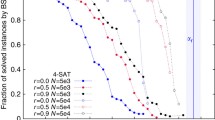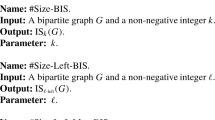Abstract
We show that the original classic randomized algorithms for approximate counting in NP-hard problems, like for counting the number of satisfiability assignments in a SAT problem, counting the number of feasible colorings in a graph and calculating the permanent, typically fail. They either do not converge at all or are heavily biased (converge to a local extremum). Exceptions are convex counting problems, like estimating the volume of a convex polytope. We also show how their performance could be dramatically improved by combining them with the classic splitting method, which is based on simulating simultaneously multiple Markov chains. We present several algorithms of the combined version, which we simple call the splitting algorithms. We show that the most advance splitting version coincides with the cloning algorithm suggested earlier by the author. As compared to the randomized algorithms, the proposed splitting algorithms require very little warm-up time while running the MCMC from iteration to iteration, since the underlying Markov chains are already in steady-state from the beginning. What required is only fine tuning, i.e. keeping the Markov chains in steady-state while moving from iteration to iteration. We present extensive simulation studies with both the splitting and randomized algorithms for different NP-hard counting problems.
Similar content being viewed by others
References
Asmussen S, Glynn PW (2007) Stochastic simulation: algorithms and analyses. Springer, Berlin Heidelberg New York
Baumert S, Ghate A, Kiatsupaibul S, Shen Y, Smith RL, Zabinsky ZB (2009) Discrete hit-and-run for sampling points from arbitrary distributions over subsets of integer hyper-rectangles. Operations Research, Johannesburg
Botev ZI, Kroese DP (2008) An efficient algorithm for rare-event probability estimation, combinatorial optimization, and counting. Methodol Comput Appl Probab 10:471–505
Del Moral P (2004a) Feynman-Kac formulae, genealogical and interacting particle systems with applications. Springer, New York
Del Moral P (2004b) Feynman-Kac formulae genealogical and interacting particle systems. Springer, Berlin Heidelberg New York
Garvels MJJ (2000) The splitting method in rare-event simulation. PhD thesis, University of Twente
Hayes T, Vera J, Vigoda E (2007) Randomly coloring planar graphs with fewer colors than the maximum degree. STOC
Kahn H, Harris TE (1951) Estimation of particle transmission by random sampling. Natl Bur Stand Appl Math Ser 12:27–30
L’Ecuyer P, Demers V, Tuffin B (2007) Rare-events, splitting, and quasi-Monte Carlo. ACM Trans Model Comput Simul 17:2
Mitzenmacher M, Upfal E (2005) Probability and computing: randomized algorithms and probabilistic analysis. Cambridge University Press, New York
Motwani R, Raghavan R (1997) Randomized algorithms. Cambridge University Press, Cambridge
Ross SM (2006) Simulation, 4th edn. Academic, London
Rubinstein RY (2008) Entropy and cloning methods for combinatorial optimization, sampling and counting using the Gibbs sampler. To be published in Information Theory and Statistical Learning. Springer, Berlin Heidelberg New York
Rubinstein RY (2009) The Gibbs cloner for combinatorial optimization, counting and sampling. Methodol Comput Appl Probab (in press)
Rubinstein RY, Kroese DP (2004) The cross-entropy method: a unified approach to combinatorial optimization, Monte-Carlo simulation and machine learning. Springer, Berlin Heidelberg New York
Rubinstein RY, Kroese DP (2007) Simulation and the Monte Carlo method, 2nd edn. Wiley, New York
Author information
Authors and Affiliations
Corresponding author
Additional information
This research was supported by the BSF (Binational Science Foundation, grant No 2008482).
Rights and permissions
About this article
Cite this article
Rubinstein, R. Randomized Algorithms with Splitting: Why the Classic Randomized Algorithms Do Not Work and How to Make them Work. Methodol Comput Appl Probab 12, 1–50 (2010). https://doi.org/10.1007/s11009-009-9126-6
Received:
Revised:
Accepted:
Published:
Issue Date:
DOI: https://doi.org/10.1007/s11009-009-9126-6
Keywords
- Combinatorial optimization
- Counting
- Cross-entropy
- Gibbs sampler
- Importance sampling
- Rare-event
- Randomized algorithms
- Splitting




